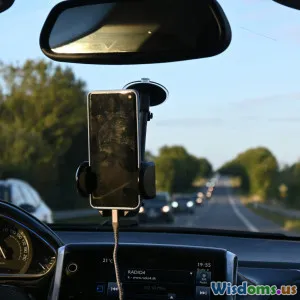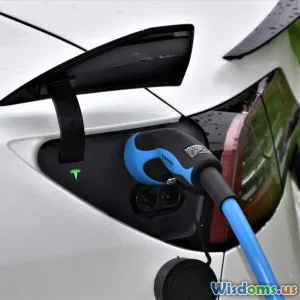
Is Your Vehicle GPS System Spying On You
7 min read Explore how vehicle GPS systems collect your data and whether they spy on you, uncovering privacy concerns and ways to protect yourself. (0 Reviews)
Is Your Vehicle GPS System Spying On You?
Introduction
Imagine this: you've just parked your car after running errands, but you receive an ad on your phone hinting at your exact whereabouts or favorite restaurants nearby. Could the vehicle you just drove be silently watching you, collecting detailed information about your travels and habits? As GPS technology has become embedded in most vehicles, concerns about privacy and surveillance have escalated. This article dives deep into the question that looms in many drivers' minds: is your vehicle's GPS system spying on you?
By understanding how GPS data is collected, transmitted, and potentially exploited, you can reclaim control over your personal information and navigate the road ahead more safely.
The GPS Technology in Your Vehicle: How It Works
What is a Vehicle GPS System?
A Global Positioning System (GPS) uses a network of satellites to pinpoint the precise location of a GPS receiver. Modern vehicles often come equipped with GPS navigation systems that provide real-time directions, traffic updates, and location-based services.
Data Collected by GPS Systems
Beyond guiding you to your destination, vehicle GPS units may collect:
- Location coordinates
- Speed and acceleration data
- Trip duration and routes taken
- Frequently visited locations
For example, many insurance companies offer "usage-based insurance" programs where GPS tracks your driving behavior to calculate premiums.
How Vehicle GPS Data Can Be Used—and Misused
The Benefits of Data Collection
GPS data significantly enhances user experience by:
- Offering tailored routes to avoid traffic congestion
- Enabling emergency services to locate vehicles quickly
- Supporting vehicle diagnostics and maintenance reminders
Moreover, fleet management companies utilize GPS to optimize vehicle usage and enhance efficiency.
When Does Data Collection Become Spying?
Concerns arise when data collected extends beyond navigation:
- Constantly tracking where you go even when navigation is off
- Sharing or selling your data without explicit consent
- Use of data for targeted advertising or profiling
For example, in 2018, researchers discovered that a major automotive manufacturer shared GPS data with third parties for marketing without clear user awareness, sparking public backlash.
Real-World Insights
In a 2022 survey by the Consumer Federation of America, 63% of drivers expressed unease about their vehicles collecting their location data, citing fears of unauthorized monitoring.
Law enforcement agencies have also utilized GPS data from vehicles during investigations, sometimes warranting legal debates over the balance between privacy and security.
Understanding Your Vehicle’s Privacy Policy and Data Sharing Practices
An often overlooked step is carefully reading the privacy policy that comes with your vehicle or navigation app:
- Does it explicitly state what data is collected?
- With whom is data shared? Advertisers? Law enforcement? Third-party analytics?
- Can you opt out of data collection?
For instance, Tesla vehicles collect significant location and usage data, but owner agreements specify the scope and conditions under which data is shared.
Methods to Protect Yourself From Potential GPS Surveillance
Disable Location Services When Possible
Turn off GPS and location tracking features when not needed. For some systems, this may reduce certain functionalities but enhances privacy.
Update Your Vehicle’s Software Regularly
Manufacturers issue updates that sometimes add privacy controls or patch vulnerabilities.
Use Aftermarket GPS Devices with Privacy Features
Consider aftermarket GPS units that prioritize data encryption and user control.
Engage Privacy Settings in Connected Apps
Vehicle infotainment systems often sync with smartphones. Manage app permissions to limit data access.
Physical Solutions
For highly concerned users, installing GPS jammers is illegal in many jurisdictions, but you might disconnect or disable tracking modules if safe and permissible.
Legal and Regulatory Protections
- In the European Union, GDPR applies to personal data collected via vehicles, imposing strict consent and security requirements.
- Some U.S. states, like California with its CCPA, bolster consumer rights regarding data collected by vehicles.
However, regulations are still catching up with advanced automotive technologies.
The Future of Vehicle GPS and Privacy
Looking ahead, technological advancements could both threaten and enhance vehicle privacy.
- Increased Connectivity: Integration with 5G and the IoT means more data collection points.
- AI-enhanced Navigation: Could personalize services while anonymizing data.
- User Empowerment: New laws and vehicle designs focused on giving control back to consumers.
Industry leaders increasingly recognize privacy as a competitive feature, emphasizing transparent data practices.
Conclusion
While vehicle GPS systems offer undeniable convenience and safety benefits, they also pave pathways to extensive data collection—some of which may feel as invasive as being 'spied on.' It's crucial to stay informed about how your data is gathered, used, and shared.
Being proactive—by understanding your vehicle’s privacy policy, managing GPS and app permissions, updating software, and knowing your legal rights—can help you balance the advantages of GPS navigation against privacy concerns.
Ultimately, the choice to trust your vehicle’s GPS system rests on awareness and control. As you embark on daily journeys, take the wheel of your own privacy.
Rate the Post
User Reviews
Popular Posts

















